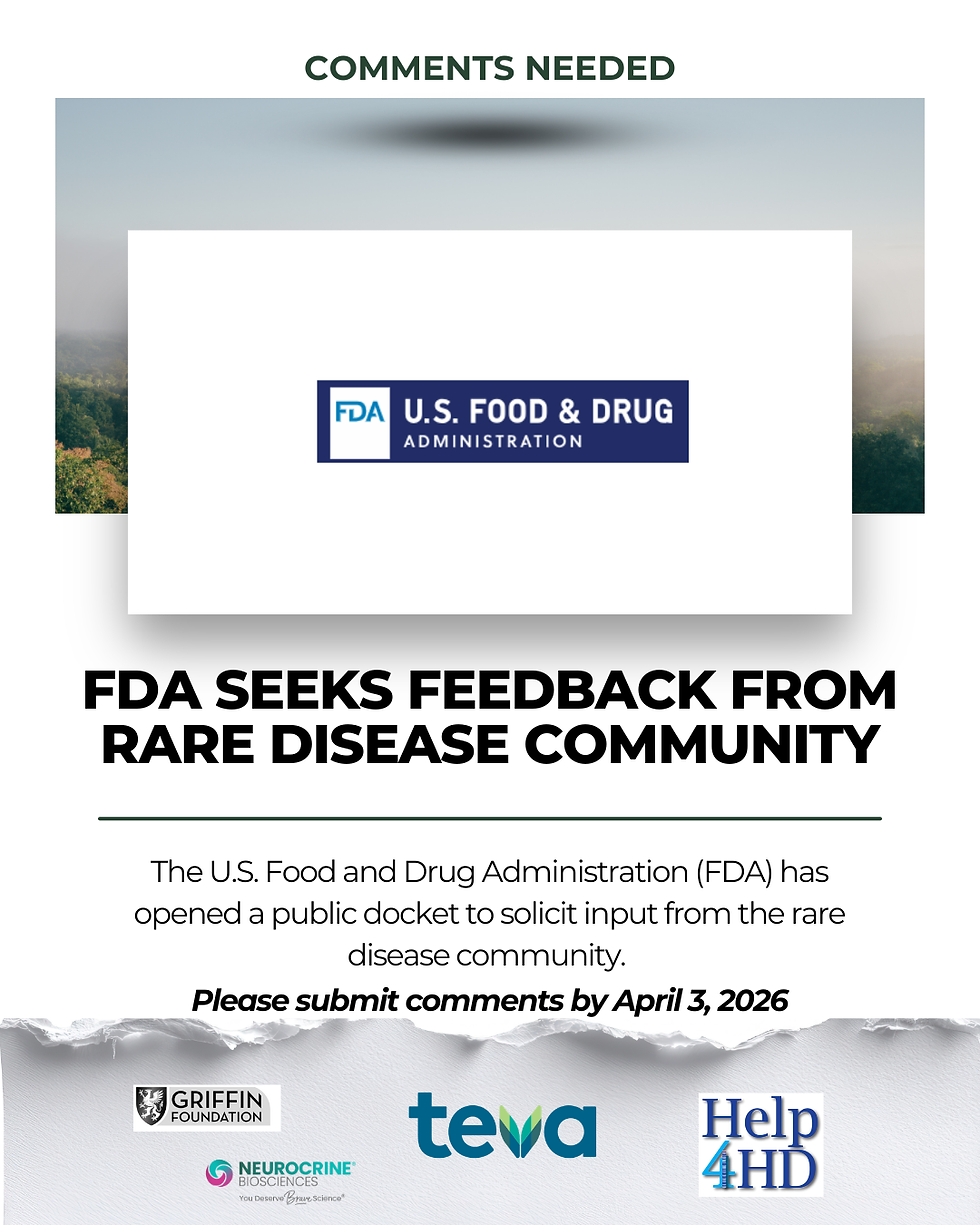Myth or Fact: Alcohol Makes Chorea Worse in Huntington's Disease
- katie8288
- Sep 22, 2024
- 2 min read

The question of whether alcohol makes chorea worse is a complex one, and the answer isn't as straightforward as we might hope. The HIPE panel discusses this question on Help 4 HD HIPE Virtual ~ Myth or Fact. Here is a summery of what was discussed.
First, let's address the myth vs. fact aspect:
The truth is, it's neither entirely a myth nor a universal fact. The effects of alcohol on chorea in HD can vary significantly from person to person. As we often say in the HD community, "When you've seen one person with Huntington's, you've seen one person with Huntington's." This variability makes it challenging to make blanket statements about alcohol's effects on chorea.
Here's what we do know:
Individual Responses Vary: Some individuals with HD may experience increased chorea when drinking, while others might find their movements become more subdued.
Alcohol as a Depressant: Alcohol is a central nervous system depressant. In theory, this could potentially reduce chorea in some individuals. However, this effect, if present, is not consistent across all patients.
Impaired Judgment and Coordination: While alcohol may or may not directly worsen chorea, it does impair judgment and coordination. For individuals with HD who may already struggle with these issues, adding alcohol to the mix can exacerbate these problems.
Balance and Fall Risk: Even if alcohol doesn't worsen chorea, it can significantly impact balance. This is crucial to consider, as falls are a major risk for individuals with HD.
Speech Impacts: Alcohol can cause slurred speech, which may compound existing speech difficulties in HD patients.
The Bigger Picture:
While the question of alcohol's direct impact on chorea is interesting, it's perhaps not the most crucial consideration when it comes to alcohol use in HD. More important factors include:
Overall Functioning: How does alcohol affect the individual's ability to function in daily life?
Medication Interactions: Many HD patients are on various medications that may interact negatively with alcohol.
Addiction Risk: There's a risk of alcohol dependency in the HD community, sometimes as a misguided attempt to self-medicate symptoms or cope with the challenges of the disease.
Cognitive Impact: HD already affects cognitive function, and alcohol can further impair thinking and judgment.
Recommendations:
Consult Healthcare Providers: Individuals with HD should always consult their healthcare team about alcohol use. Most providers may suggest moderation.
Moderation is Key: If alcohol is consumed, it should be in moderation. This might mean limiting intake to a glass of wine or a beer with a meal.
Monitor Effects: Pay attention to how alcohol affects you or your loved one with HD. If negative effects are observed, it's crucial to discuss this with healthcare providers.
Address Underlying Issues: If alcohol is being used as a coping mechanism, it's essential to address the underlying challenges and find healthier alternatives.
Be Aware of Risks: Understand that alcohol can compound existing HD symptoms, particularly balance issues and cognitive impairments.
In conclusion, while the direct impact of alcohol on chorea in HD isn't clear-cut, the broader implications of alcohol use in HD are significant. As with many aspects of managing HD, the key is individualized care, open communication with healthcare providers, and a focus on overall quality of life and safety.





I’ve been doing the PD-5 treatment from limitlesshealthcenter. com for about 5 months. it doesn’t seem like I’m getting any better, but overall I actually have. My husband says it’s has done me a lot of good in terms of balance and ability to walk and get up from chairs. I can now write without my hands shaking. I feel better now than I have felt in years, and I can feel my strength again.
I was diagnosed with Parkinson’s disease four years ago. For over two years, I relied on prescription medications and therapies, but unfortunately, the symptoms continued to worsen. My mobility declined, tremors increased, and I experienced growing fatigue and discomfort that affected my daily life. Last year, out of desperation and hope, I decided to try an herbal treatment program from NaturePath Herbal Clinic. Honestly, I was skeptical at first, but within a few months of starting the treatment, I began to notice real changes. My energy improved, the discomfort eased, and I felt stronger and more capable in my daily life. Incredibly, I also regained much of my stamina, balance, and confidence. It’s been a life-changing experience I feel more…